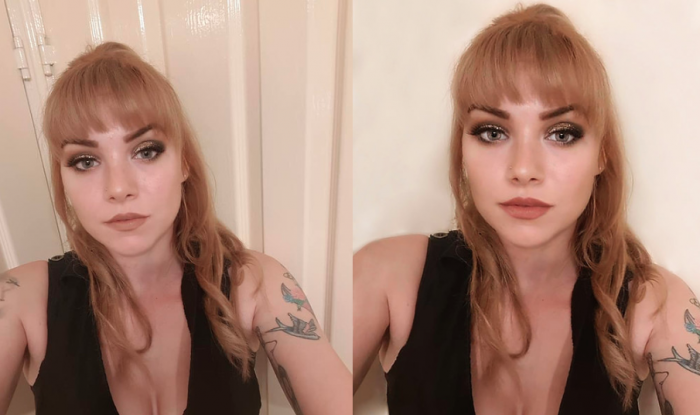I’m scrolling through Facebook when I see the fourth ad this week of a photo editing app.
I’m secretly mortified, wondering if Facebook caught me. I’m a millennial and I understand how the internet, better yet, advertising, works. I know they tailor their ads to the places, products, and apps we search. But my editing days are long behind me, so why are they hashing up the past?
I was, like many of you reading this, an avid Instagram user. I had over a thousand friends, regular-ed hundreds of likes on each post, and gained satisfaction from the aesthetic of my feed.
Until one day—a day only god and apparently Facebook can remember—I downloaded Facetune.
Basically, it can whiten your teeth, smooth your pores, change the color of your eyes, the shape of your nose, shrink your tummy, and make the sky behind you look 10 times better in the photo than in person.
And it is majorly popular.
Facetune, according to co-founder and CEO Zeev Farbman of Lightricks (the company that created Facetune 1 and 2), says the company has seen 180 million downloads across its paid apps.
And I joined the masses. It all started with a tweak, whiter teeth, maybe add some detail on the foreground making the photo seem higher quality. But it didn’t stop there. One day, I discovered “reshape.” Soon, inches were blurred away and bits of me were moved about. Perfect photos appeared.
And my likes went up. But my self-esteem went down.
I didn’t notice it at first. Because as much as social media is wonderful, it can also be deeply demoralizing. It helped me sit in my seat of loss of consciousness. Not like I fainted, but I was unconscious of the ways I was feeling while using it. Everyone edits their photos, I would say. Not even realizing that the only reason we make justifications is because we feel bad about something and need to justify it.
I would scroll through old photos of myself in current states and wish I looked like that—a filtered, edited version of myself that I never actually looked like. It goes layers-deep, and it is an epidemic that is sweeping the world, causing emotional damage to people, consciously and unconsciously.
One day, I was on the bus and I looked over and saw a young man editing the acne spots off his face. On his cheeks were large, cystic blemishes and scars from old ones, cleared but not gone. He diligently zoomed-in, smudging the last off his chin, and then unconsciously his free hand grasped his face and his fingers traced down his cheeks until meeting the zit he just erased. He picked at it, not once, not twice, but nearly until my stop came. I was on long enough to see him post the photo on Instagram with an added filter and a caption with a peace sign in it.
Where is his peace? How is his inner state truly doing?
While the argument could be made that editing himself has given him confidence, where is that confidence now? Has he yet to realize that his body and his mind know the truth? That he does have a face of acne no matter how much Facetune he uses.
I had to learn it the hard way. I got caught, remember. But unfortunately for you, the reader, I wasn’t caught in some dramatic way—peers posting side by side, split before and after photos—I was caught by me.
I was scrolling down my feed when I clicked on a picture of mine posted in my early Facetune days. I gasped. Right where I tucked my tummy there was a mosaic tile behind me smeared away and off-centered. Sh*t.
Now, this isn’t a huge deal if we continue to live in the world of normalizing editing our photos. The Kardashians have been caught with Facetuning mistakes regularly and they’re billionaire, A-list stars. Famous MUA (makeup artists) upload YouTube tutorials on Facetuning and reach millions of views from people curious about how-to from the best who do.
So this wasn’t why I gasped. Not from fear of who might have noticed. I gasped because I remembered that day. That day before the editing. And I remembered that I was happy. My jeans fit snug but tugged at all the right places, my outfit was on point, my face clear with a bit of a sun kiss. I edited myself on one of my best days.
If I feel the need to edit myself even on my best day, where has my appreciation and self-love gone? I realized right then: is it truly self-love to edit yourself at all?
So I deleted Facetune 1 and 2.
But that wasn’t enough for me. Once you wake up, it’s hard to stay asleep. I saw a pattern—a pattern of unhealthy stimulus to both my mind and body. I watched as others morphed their bodies, whether discreetly or obliviously apparent. My comparison nature, while dimmed, did not delete away. I still fed into the monster of self-judgment and the need for satisfaction from others. It was like I took away the editing tool but still looked at everything through an edited lens.
So I did something really bold. After I deleted Facetune, I deleted Instagram.
Now, when something great happens in my life, I send the photo, the un-edited photo, to the people in my life who matter most. I am behind in who is in Cabo, or “misses being by the beach” in the dead of winter. I haven’t the slightest clue what my college friends wore for New Year’s or whose Instagram story looks most interesting. But I know who I am. I know how I look and who cares to appreciate it, honestly.
You might be reading this saying, “Why not stay on the app and not edit your photos?” To which I reply with Khloe Kardashian’s famous words, “Remember you can’t Facetune your energy but you can always Facetune your face.”
She probably didn’t mean this in the same way I’m implying, but who knows what those girls are ever saying anyway?












Read 2 comments and reply